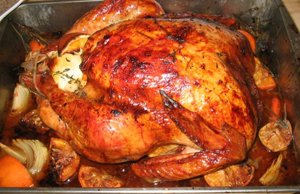- Blog
- Food & Agriculture
- No turkey for Thanksgiving this year?
No turkey for Thanksgiving this year?

Donate Now!
Your contribution will benefit Friends of the Earth.
Stay Informed
Thanks for your interest in Friends of the Earth. You can find information about us and get in touch the following ways:
This article was cross-posted on Huffington Post and was co-authored by Marie Brill of ActionAid.
As you sit down for Thanksgiving dinner with friends and family this year, imagine looking across the table and not seeing a turkey. It may be hard to fathom, but it is a reality too many Americans face this year. A story in the Manteca Bulletin earlier this month tells the sad story of the Second Harvest Food Bank in the Central Valley of California, which distributes Thanksgiving baskets to nearly 3,000 local families — and likely won’t have the resources to serve all those in need.
In these hard economic times, the combination of unemployment and high food prices means many American families are struggling to put food on the table.
Our biofuels policies are a big cause of the rising cost of food in recent years, and it just feels wrong to use food for fuel with so many families struggling to feed their families. Yet due to federal ethanol subsidies, almost half the corn grown in the United States will be diverted to biofuel production this year, leaving little for food and feed. These wasteful subsidies are driving up the price of everything from eggs to milk to — yes, turkeys — and undoubtedly, some families will just have to go without. Second Harvest Food Bank will have to pay 99 cents a pound for turkey, 37 cents a pound higher than last year.
The impacts aren’t limited to the U.S. either. As global corn prices hit record highs, people in developing countries all over the world faced food insecurity, hunger, and uncertainty. The November World Bank’s Food Price Watch calculates that the price of corn rose 43 percent globally last year, and as a result at least 44 million people were pushed into extreme poverty. Developing countries were hit especially hard. In Uganda, for example, where the average family spends well over half of their income on food, the price of corn rose 86 percent.
And let’s not forget the cost of the subsidies themselves. The biggest corn ethanol subsidy, the Volumetric Ethanol Excise Tax Credit, costs us over $6 billion per year. In these tough economic times, American taxpayers shouldn’t be footing the bill for the ethanol industry, which has been on the public dole for three decades.
It isn’t worth the cost. Long have we supported corn ethanol production under the assumption that it is a greener alternative to fossil fuels, but the jig is up.
Even if we used every single bushel of corn in the US for ethanol production, we’d only replace two percent of our fossil fuel use. Cradle to grave carbon emission analyses have found that corn ethanol provides little, if any, improvement over regular gasoline. In fact, the EPA’s own data shows that right now, corn ethanol is actually worse for the environment than regular gasoline.
Yet this is the time of year when we reflect and give thanks for what we have. The good news is that VEETC is set to expire at the end of the year. If you’re getting déjà vu, it’s because VEETC was also set to expire at the end of 2010, but the corn ethanol and agribusiness industries and their Congressional supporters renewed it at the last second.
Let’s be sure that does not happen again this year. It’s our responsibility to let our congressional representatives know how we feel. Please call your congresspeople today and tell them the time has come to end taxpayer support for corn ethanol. We should not be taking food off our tables to put it in our gas tanks.
